MercoPress. South Atlantic News Agency
Tag: Bernardo Arévalo
-
Monday, October 27th 2025 - 19:14 UTC
Guatemalan President denounces “coup attempt”
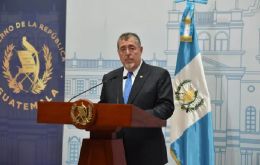
Guatemalan President Bernardo Arévalo on Sunday delivered a strong rebuke against what he called an attempted “coup,” publicly accusing Attorney General Consuelo Porras and Judge Fredy Orellana of leading a “criminal alliance” to dismantle the country's democratic institutions.
-
Thursday, February 20th 2025 - 19:58 UTC
Spanish Labor Minister announces tour of Argentina and Uruguay
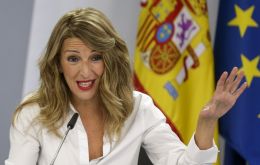
Spain's Labor Minister and Second Deputy Prime Minister Yolanda Díaz will be touring Argentina and Uruguay later this month to attend Yamandú Orsi's inauguration in Montevideo on March 1, among other engagements, her office in Madrid announced Thursday.
-
Monday, January 15th 2024 - 20:34 UTC
Arévalo sworn in as President of Guatemala at last
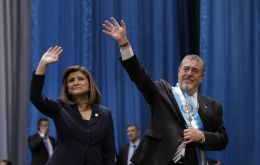
Although some ten hours later than scheduled, Bernardo Arévalo de León was eventually sworn in early Monday as Guatemala's new president for the period 2024-2028. After his inauguration, he was to offer his first speech as constitutional head of state. Before Arévalo's turn, 160 deputies took their oaths of office, thus extending the ceremony in time beyond projections.
-
Monday, December 18th 2023 - 09:56 UTC
Clearing the way for Guatemala elected president to take office in January
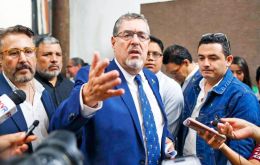
Guatemala the Central American country long linked to political instability and extreme violence in solving many of its domestic conflicts, is again a hotspot in the region since an elected president, who should be taking office in mid-January, has been facing growing supposedly 'legal' impediments to his legitimate right, supported by an overwhelming majority of voters who surprised the “political establishment”.
-
Wednesday, December 13th 2023 - 10:09 UTC
UN, US and Mercosur call on Guatemala to respect election results and denounce “an attempted coup”
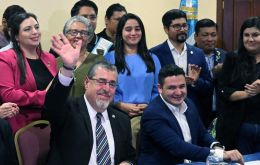
The UN Secretary-General Antonio Guterres, Mercosur member countries, the European Union and the US have called on Guatemala authorities to impede the Central American country's Attorney General's office to annul the general election result preventing President-elect Bernardo Arevalo from taking office in January.
-
Saturday, December 9th 2023 - 10:23 UTC
Guatemalan Prosecutors want June 25 elections annulled
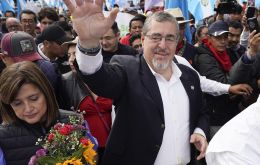
Guatemala's Public Prosecutor's Office said this week that the voter rolls used in the elections won by Bernardo Arévalo de León “were not authorized” by the Supreme Electoral Tribunal and therefore the results thereof were “null and void.” Arévalo had warned on Sept. 1 that Attorney General Consuelo Porras was carrying out a “coup d'état” against him to prevent him from taking office on Jan. 14 to succeed Alejandro Giammattei.
-
Saturday, September 2nd 2023 - 10:55 UTC
Guatemalan President-elect says there is a coup in the making
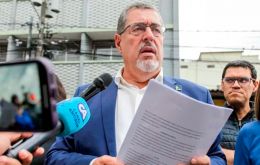
Guatemalan President-elect Bernardo Arévalo de León Friday said there was “a coup d'état in progress” in his country, with many organizations wanting to “break the constitutional order and violate democracy” by attacking him and his Semilla Movement party.
-
Wednesday, August 30th 2023 - 07:47 UTC
Bernardo Arevalo, with total support from US, confirmed as Guatemala's next president
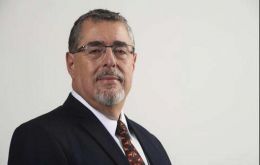
Guatemala's Supreme Electoral Tribunal reaffirmed center-left candidate Bernardo Arevalo's victory in the strongly disputed presidential election. Arevalo's victory received strong support from the United States State Department and the Organization of American States, OAS.
-
Monday, August 21st 2023 - 11:25 UTC
Uruguayan-born Bernardo Arévalo de León wins Guatemalan elections

Uruguayan-born Bernardo Arévalo de León of the center-left Semilla (Seed) Movement, a sociologist with a PhD in Philosophy and also the son of a former head of state, will become Guatemala's next president after Sunday's landslide at the runoff victory over former First Lady Sandra Torres Casanova of the National Unity of Hope (UNE)
-
Friday, August 18th 2023 - 11:03 UTC
Sunday presidential elections in two countries where entrenched violence and corruption prevail, Ecuador and Guatemala
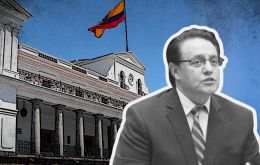
Next Sunday two Latin American countries suffering from extreme political turmoil will head to the polls in presidential elections, which hopefully can help both countries overcome situations of death, ongoing violence, and blatant corruption.
